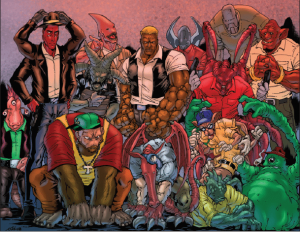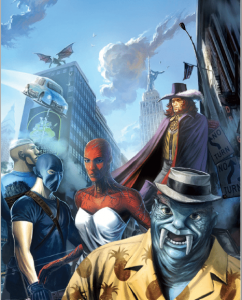In case you missed it, George R.R. Martin has another property coming to the small screen. You’d be forgiven for thinking it might be related to his impossibly lucrative Game of Thrones, since, thanks to HBO, dragons and ice zombies are now so deeply embedded in the mainstream it’ll be years before we’re rid of them.

No, this most recent announcement is related to some of his earlier work: Wild Cards, a science-fiction anthology series about superheroes, conspiracies, and at least one sex magician. Along with writers Walter Jon Williams, Melinda Snodgrass, Victor Milan, John Jos. Miller, and a frankly stupid number of other frequent contributors, Martin created a bustling, imaginative alternate history where Fidel Castro was a pitcher for the Dodgers, McCarthy went after mutants, and every now and then, an alien intelligence drops spores on major population centers.
I went a little nuts for these books after I discovered Game of Thrones, and I still think they’re underrated gems. There’s a lot to talk about (with 20+ books, there better be), and hopefully closer to the premiere I’ll get to share a bit of my knowledge. What I want to talk about now is one specific thing that Wild Cards did well, better than almost anything else. But first…
The Deal
As quick as I can: there are these aliens, they’re called the Takisians, okay? Basically humans, but some of them have psychic powers. That’s not super important. They’re continually at war with each other. One group makes a virus, a super-lethal plague that’ll kill 90% of the people exposed to it. That sounds pretty good! The only problem: of the other 10% that survives, 90% are hideous mutants who may or may not also breathe fire or shoot lasers or whatever. The other 10% get superpowers.
Now, you can imagine how a virus that might turn 1 in every 100 people into a superhero would be a pretty poor weapon, so the Takisians decide to test the virus on Earth. There’s a lot, and I mean a lot, more to it than that, but suffice it to say: Wild Cards is about an alien virus that kills or mutates those it infects. It’s not just a clever origin story for a shared universe; it’s the best superhero origin story since Stan Lee decided “mutant” was a sufficient explanation for a bald guy and his family of paramilitary teenagers.
The Flop
The name of the series comes from the name of the virus (technically it’s Xenovirus Takis-A, but “Wild Card virus” is punchier), which is itself a reference to the random nature of the infection. You can “draw the Black Queen,” which is death; you can “draw a Joker,” which means you turn into a hideous freak; or you can “draw an Ace,” which means you get the powers without the deformity. If you’re an Ace with a useless power (like the ability to hover an inch off the ground, or turn your skin blue), you’re a “Deuce.”

The strength of an anthology series, in theory, is the ability to tell stories in many different genres, and the Wild Card virus is the perfect tool to do exactly that. If you want to write a high-stakes political thriller, you can do that–make the Presidential candidate a secret Ace! If you want to write crime drama, you’ve got an Ace that can walk through walls. You can populate the world with pitiable Jokers, comic relief Deuces, and intolerant Nats (that’s us, the ones without powers). Since there are no limits on what the virus can actually do, characters in the series range from a guy with an elephant trunk for a nose to a telekinetic who flies around in a converted VW Beetle.
It’s such a simple concept (alien virus!), but it allows for an incredible variety of stories. That versatility is a huge part of why the Wild Card series works.
The Turn
The other big reason, of course, is the nature of the infection event itself–an airburst over New York City in 1946. Wild Cards is alternate history fiction as much as it is sci-fi, and the divergence from our world occurs at that point. At first, it doesn’t make much of a difference; okay, people in the 50s and 60s can fly.
As the series goes on, however, the world is built up, and the genius becomes a little more apparent. Not only does the Wild Card event change the balance of power on the world stage (America has Aces! How will the Soviet Union respond?), but it provides the storytellers with the ability to introduce conflict at any place, at any time. World a little too boring? There’s been an outbreak of the virus in downtown LA! Ever wondered what the geopolitical landscape of the Middle East would look like if Egypt had superheroes? Drop the Wild Card virus in Port Said and find out!
It’s in the versatility, as I said. The Wild Card virus gives you options for stories, and that’s not a small deal.
The River

It all comes down to how easy it seems, looking back at it. How obvious. It’s a profoundly simple idea, an alien virus that kills, mutates, or gifts everybody who catches it. But the execution is so interesting and inventive that it lives up there with all the other ideas I wish I had thought of, like cronuts and Gear Ties.
There’s no release date for Wild Cards, not even a guarantee it’ll get made. But even if a TV adaption doesn’t materialize, the Wild Card books are definitely worth some space on your shelf (if you have any space left over after The Winds of Winter comes out.

